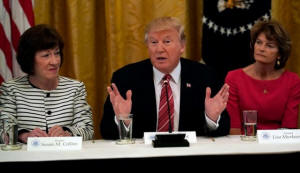|
Senate aims for a 'skinny' Obamacare
repeal as other options fail
 Send a link to a friend
Send a link to a friend
 [July 27, 2017]
By Susan Cornwell and Yasmeen Abutaleb [July 27, 2017]
By Susan Cornwell and Yasmeen Abutaleb
WASHINGTON (Reuters) - Republican U.S.
Senate leaders, struggling to keep a seven-year promise to end
Obamacare, turned their focus on Wednesday to passing a slimmed-down
"skinny" repeal measure that would throw the issue into negotiations
with the House of Representatives.
The last-ditch effort came after senators voted 55-45 against a straight
repeal of Obamacare, which would have provided for a two-year delay in
implementation to give Congress time to work out a replacement. Seven
Republicans opposed the measure.
It was the Senate's second failure in 24 hours to repeal the 2010
Affordable Care Act, popularly known as Obamacare, which expanded health
insurance to about 20 million people, many of them low-income. On
Tuesday, senators rejected the repeal-and-replace plan Republicans had
worked on since May.
The failures underscored the party's deep divisions on the role of
government in helping provide access to healthcare as the Senate
conducted its second day of a freewheeling debate that could stretch
through the week.

Republicans said they were still working out what would be in a skinny
repeal, which could simply eliminate mandates requiring individuals and
employers to obtain or provide health insurance, and abolish a tax on
medical device manufacturers.
Senator John Thune, the No. 3 Senate Republican, said the party was
trying to "figure out what the traffic will bear, in terms of getting 50
of our members to vote for things that will repeal as much of Obamacare
as possible."
Republicans hold a 52-48 majority in the Senate.
Any Senate legislation would be enough to kick the issue to a special
negotiating committee with the House, which passed its own version in
May. If that panel can agree on a new bill, the full House and Senate,
both controlled by Republicans, would again have to approve the
legislation - a process that could last months.
"I think people would look at it not necessarily based on its content,
but as a forcing mechanism to cause the two sides of the building to try
to solve it together," Republican Senator Bob Corker said. "Thatís going
to be the last chance."
Senator John Cornyn, the No. 2 Senate Republican, told reporters there
was growing support for a slimmed-down approach that would kick the can
to negotiators.
"I think there is plenty of agreement," he said.
SEEKING 'MORE ORGANIZED PROCESS'
President Donald Trump has come down hard on his fellow Republicans for
failing to act on Obamacare, something he promised repeatedly to repeal
and replace in his election campaign last year. Some Senate Republicans
were growing uncomfortable with the chaotic debate.
"We've got to have a more organized process," Republican Senator Ron
Johnson said, noting the skinny repeal would simply delay acting on the
core issue. "We just don't have the courage and really the intestinal
fortitude to suck it up and ... do this right."
[to top of second column] |

President Donald Trump meets with Senate Republicans about
healthcare in the East Room of the White House in Washington, June
27, 2017. Trump is flanked by Senators Susan Collins, L, (R-ME) and
Sen. Lisa Murkowski, R, (R-AK). REUTERS/Kevin Lamarque

Late on Wednesday, only 10 senators voted for a largely symbolic
amendment stating lawmakers' commitment to preserve a part of
Obamacare that helped states expand the government's Medicaid
insurance program for the poor to cover a wider net of people.
Democrats refused to approve any amendment to a bill they dislike
and the vote primarily highlighted deep divisions among Republicans.
The amendment was introduced by Senator Dean Heller, who faces a
tough re-election fight in Nevada next year, and supported by
Senators Susan Collins, John McCain and other party moderates who
have expressed skepticism about the repeal-and-replace process.
Trump attacked one of those senators, Lisa Murkowski of Alaska, by
name in an early morning tweet on Wednesday. Murkowski, one of two
party members who voted on Tuesday against opening debate on a bill
to end Obamacare, told MSNBC she was not worried about the political
fallout.
"Every day shouldn't be about winning elections. How about just
doing a little bit of governing around here?" she said.
Healthcare industry organizations are similarly troubled and have
urged a more bipartisan effort.
The Blue Cross Blue Shield Association, which represents health
insurers across the country, said that if the individual mandate is
repealed, it must be replaced with incentives for people to buy
health insurance and keep it year-round.
The mandate is considered critical to helping hold down the cost of
premiums, because it means that healthy people as well as the sick,
who incur high medical costs, buy insurance.

The group also said the government needed to fund subsidies for
medical expenses and provide funds to cover high-cost patients.
Anthem Inc <ANTM.N>, a health insurer with more than 1 million
customers in Obamacare individual insurance plans, threatened to
further shrink its 2018 market participation because of uncertainty
about the government paying for the subsidies that make the plans
affordable for millions of Americans.
(Additional reporting by Richard Cowan, Amanda Becker and Caroline
Humer; Writing by John Whitesides and Lisa Lambert; Editing by Mary
Milliken and Peter Cooney)
[© 2017 Thomson Reuters. All rights
reserved.]
Copyright 2017 Reuters. All rights reserved. This material may not be published,
broadcast, rewritten or redistributed. |